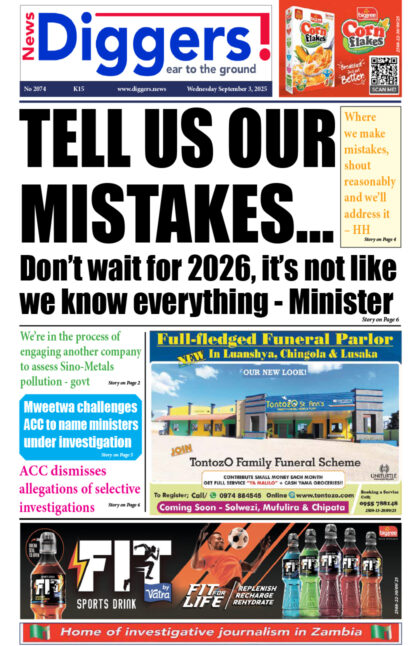Economist Chibamba Kanyama has urged Finance Minister Dr Bwalya Ng’andu to start engaging the International Monetary Fund (IMF) Mission Chief for Zambia so that a new Resident Representative is sent to replace Alfredo Baldini who was recalled a year ago.
Kanyama said in a statement that Baldini’s replacement would be the Ambassador whom the Zambian government could start engaging to facilitate smooth programme discussions.
Last week, the IMF Executive Board expressed concern over Zambia’s ballooning debt levels now standing at 78 per cent of the country’s Gross Domestic Product (GDP).
This was after the conclusion of its 2019 Article IV consultations with Zambia.
After analyzing the outcome of the discussion between the IMF Board and the Zambian government, Kanyama said the position of the IMF Board was not about hopelessness, but a clear guidance of what actions government needed to take to reverse the deteriorating economic fortunes.
He encouraged the Minister of Finance to meet and agree with the IMF Mission Chief on a clear programme roadmap for a possible bailout before the 2021 general elections, which he said would have implications on programme negotiations.
“This has been a highly anticipated statement by Eurobond holders. They have been glued to the IMF website in past few months to know the position of the IMF on Zambia’s economy. IMF Board statements go through extensive reviews within the Fund. The meeting on Zambia took 30 minutes as per standard but much of the work was done weeks before the Board Meeting. What we are now reading is the Fund position on Zambia, expressing deep concern on public debt which, according to the Fund, is a key driver to the deterioration of the economy; putting us in danger of debt distress. What the IMF Board has assessed is not new to Zambia, not even to the government. Those fears have recently been expressed by government itself, leading to ‘re-announcement of austerity measures in June’. What is new is that the concerns are coming from the IMF Board,” Kanyama stated.
“The position of the IMF Board has implications on the performance of the Eurobond and capacity of Zambia to refinance the external debts. Investors were expecting a bit more optimism from the global monetary watcher and financier. The reading of the situation by investors is that Zambia may default on debt and this is their takeaway from the IMF Board statement. They know IMF always cultures public statements in a manner they do not negatively affect investor perceptions of the given economy. However, the position of the IMF Board is not about hopelessness. It has very clearly guided Government on actions to take to reverse the deteriorating economic fortunes and this is summed up in one sentence, ‘Directors welcomed the Cabinet decision in late May to indefinitely postpone the contracting of all new non concessional loans, cancel some committed but undisbursed loans and enhance the control and management of disbursements of foreign financed loans, and to strictly adhere to public financial management rules under the 2018 PFM (Public Finance Management ) Act’.”
He expressed faith that the IMF was still ready to help Zambia if the government was willing to accept the invitation.
“What I strongly read from the IMF Board position is that IMF is ready to help Zambia. Where else would Zambia get reasonable concessional loans away from the Fund itself? This message is carefully nuanced in the statement and government observes the hidden but clear invitation. What this means is that Finance Minister Bwalya Ng’andu should pick up the phone and call the Mission Chief for Zambia to do two things. First, ask her to send a replacement to Alfredo Baldini, IMF Resident Representative, who was recalled in July 2018…Second, the Minister should agree with the Mission Chief on a clear programme road map, more so that we are heading for general elections in two years’ time. This event has implications on programme negotiations,” stated Kanyama.
“The earlier it is done the better and I want to assure government that an IMF programme will actually do more good to economic stability and public support than harm…”

























One Response
And yet there are eminent Zambian economists who strongly hold the position that does not need an IMF bail out package without proffering specific ways and means by which Government will meet external debt obligations as they fall due. This is obviously not helpful. If there were workable alternatives to generate revenues internally without placing undue burden and pain on citizens, let those who are not in favour of the IMF package, let those in the know bring these to the table for Government consideration.